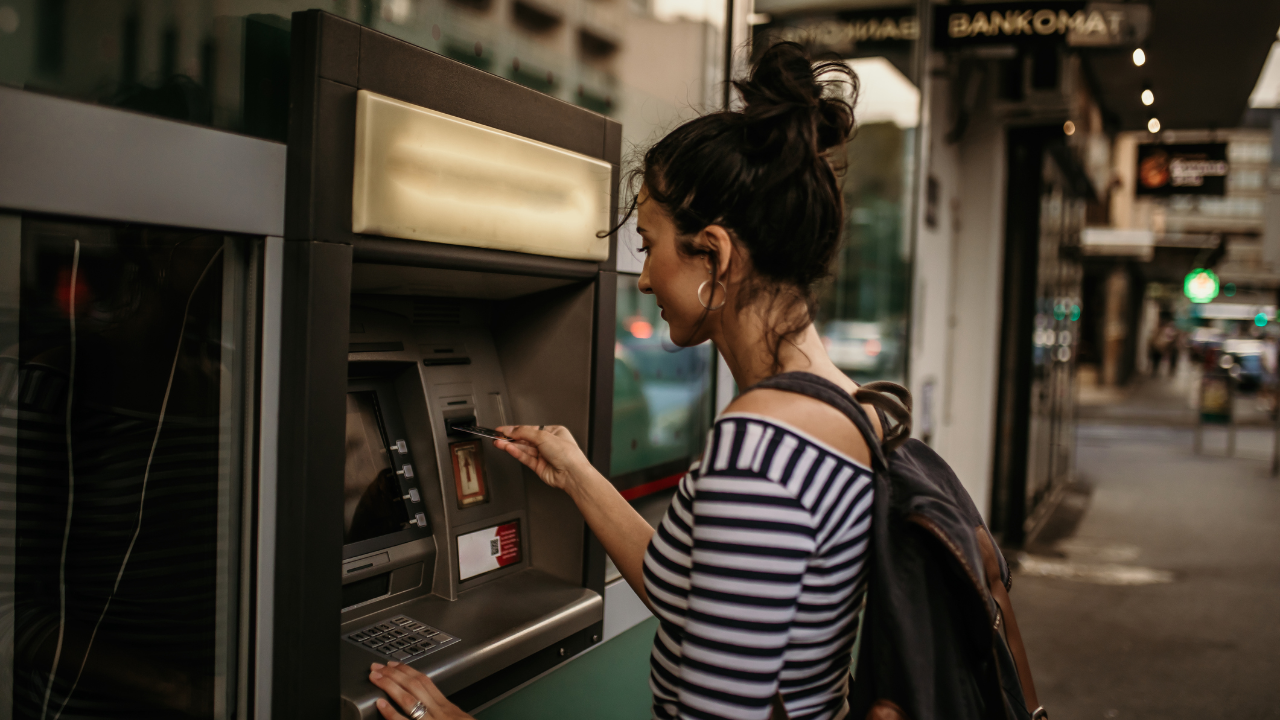Can you let someone use your credit card or lend yours?

Key takeaways
- The only way to know if you can share your credit card legally is to review your credit card agreement. Even if sharing is permitted, it’s not encouraged or suggested.
- Letting someone use your credit card with permission could put you at risk for unexpected charges and complications with your account.
- Many credit card agreements do not allow for sharing of credit cards and doing so can result in legal consequences.
- If you still choose to share your credit card, take precautions like setting spending limits, alerts and locking your card to prevent unauthorized charges.
You’ve likely casually handed your card to a colleague, family member or friend before without incident, and they’ve likely done the same with you. Since you’re lending your credit card to someone you trust, it shouldn’t be a problem, right? Plus, it’s convenient for times when you’re too busy to go to the store, so maybe you send your kid with your card instead. It’s commonplace for many, but is it legal to use someone else’s credit card, even if they grant permission?
Regardless of the circumstances, sharing your credit card isn’t the best decision to safeguard your finances.
Can someone use my credit card?
There are no state or federal laws making it illegal to share your credit card with someone. Often, the convenience of lending your card to a family member or friend for a quick purchase seems harmless enough not to give it a second thought. That said, many cardholder agreements explicitly prohibit the practice — they approved you for the card, after all, not your friend or relative.
Other card issuers, like Chase, don’t specifically outline not sharing your credit card, but include language reiterating that you’ll be responsible for the purchases. Even though it’s allowed, it’s not encouraged nor recommended behavior.
Some cardholders might ask, “If I add them as an authorized user it’s fine, right?” In most cases, yes. Adding someone as an authorized user means they will have a card in their own name. However, if you’re selling authorized user access — charging a fee to add random people to your credit card account as authorized users — that violates your credit card agreement and puts you at risk of the bank shutting down your account, not to mention at serious risk of identity theft.
Before handing over your best credit card or loading it into the digital wallet of someone you trust, comb through the fine print of your card agreement to thoroughly understand the terms of your specific card. If there are no restrictions, proceed with caution. Keep in mind, card issuers will still hold you liable for any charges made on your credit card by a person you allowed to make the charge. Without a grasp of the limits, sharing your credit card could stir up chaos in your finances.
The risks of sharing a credit card
Consider this example: You want to cover your office’s coffee and bagels while you’re in a meeting. Sending the intern with your credit card doesn’t seem all that risky. But let’s say the intern accidentally drops your credit card down the sewer while they’re balancing six drinks. Or the cashier rejects the payment because the cardholder’s ID doesn’t match the name on the card.
Worst case scenario, your friend or family member — or intern — gets accused of credit card theft and fraud at the register. It’s unlikely, but not an impossibility. By comparison, a lost credit card is relatively minor, but these aren’t the only problems that could arise. When you share your credit card, you’re also putting yourself in the path of larger risks:
- Getting your account revoked if your cardholder agreement restricts sharing
- Added difficulty during fraud investigations
- Potential interpersonal conflicts between you and the other person
- Liability for any charges they make, even if it wasn’t what you agreed upon
- Legal charges for violating the terms of your credit card agreement
When you lend your credit card to someone else, you’re entrusting that person with using your credit responsibly. And that’s the problem. They weren’t approved for the credit card in the first place — you were.
So, even when you’ve given them permission to use your credit card, you’re the only one legally responsible for repaying the balance and the only one with a credit score on the line. That could be a problem if the person you’re passing your plastic to isn’t respectful of your finances.
“With one of my first credit cards as a young adult, I made the decision — that I now see as foolish — to share one of my credit cards with my then live-in boyfriend. I communicated strict boundaries around using my credit card and collected money to pay off the balance each month. Still, he made an impulsive purchase without consulting me and maxed out my card, resulting in a major hit to my credit score and damaged trust.
“I called my card issuer, that informed me that since I gave him my card, they can’t file a fraud claim, and I’m the only one responsible for repaying it. So, I closed the card and requested a new one, but the damage was already done. Luckily, he repaid the balance before we went our separate ways, but I’ll be the first to admit that it could have easily been much worse.” — Seychelle Thomas
Normal protections may not apply
In normal cases of credit card theft or fraud, you have federal laws on your side protecting you from liability for fraudulent charges. However, when sharing your credit card, federal protection laws don’t apply.
With true fraud, there are Federal Trade Commission (FTC) protections that usually limit cardholder liability to just $50, but these protections aren’t applicable if you willingly give your card to another person. The rules are specific when it comes to fraud. If you loan your card to another party for use, it then becomes your responsibility to resolve whatever debts are incurred.
When you give someone permission to use your card, that person technically becomes an authorized user while in possession of your card. In that case, there’s nothing illegal about the arrangement and, assuming it isn’t prohibited by your cardholder agreement, there’s nothing wrong with doing this even when you haven’t officially added the person as an authorized user.
Still, as with an official authorized user situation, the primary cardholder is responsible for all the charges.
How to handle unauthorized credit card charges
When you’ve volunteered your card to someone else, the harmless purchase you thought would be made could go awry. Whether the other person lost your card, it ended up in the wrong hands or they bought more than what you originally discussed with your card, unauthorized charges have to be taken seriously.
For example, you send your friend out for party decorations with a budget of $100. Hours later, they come back with a fog machine, disco ball, strobe lights and other party decor totaling $653. Clearly, there’s going to be disagreement over the cost because you only authorized a $100 purchase.
If the dispute falls between you and an acquaintance or family, then try to resolve it by requesting swift reimbursement for the excess charges, including any assessed interest. Then have the existing card shut down and request a new card number through your issuer.
But what happens if that friend refuses to reimburse you for their overspending? That’s when you should take these steps:
1. Notify the bank immediately
Call your card issuer to let them know that you have lost possession of the card, so they can turn off that card. They’ll issue a new card number and ship a new card to your address. You’re responsible for the excess charges, but you can still prevent new charges from cropping up.
2. Review your statements
Take a look through your transaction history, pending transactions and credit card statements to gather any other unauthorized charges that need to be resolved.
3. File an identity theft report with the police
Credit card fraud is considered a form of identity theft, and the police can get the ball rolling with formal charges if the other person is refusing to pay you back. Your card issuer will likely request a copy of the police report in order to process your claim.
That said, be aware that it will likely be harder to plead your case when you willingly gave your card to the person in the first place — and could mean pressing charges against a loved one.
Alternatives and tips for sharing credit cards
It’s best to avoid lending out your credit card whenever possible, but instances may still arise where there’s no other option. When that’s the case, you can still get what you need while minimizing your risk. Instead of casually letting someone use your credit card, take these steps to safeguard your account and protect the person you’re sharing it with:
- Set up automated text or email purchase alerts for your bank account.
- Use a card lock feature, if available, to prevent extra purchases.
- Send a note with your friend or family member in case the merchant has questions.
- Consider adding them as an authorized user so they’ll have a card with their name on it.
- If they’re already an authorized user, set a spending limit.
- Match purchase receipts with your transaction history to spot unauthorized purchases.
- Close and replace compromised cards immediately.
- Store your credit card statements securely.
- Offer to reimburse their purchase through a payment service like Zelle or Venmo.
If you’re just sending your kids to the store, it’s best to write a note that permits their purchase and provides a contact number for you just in case the merchant has questions about the card. It protects the merchant from a false charge, and reduces the risk of a merchant confiscating your card or, worse, calling the authorities.
However, if you need to grant access to your card for an extended period, adding them as an authorized user might be a better option.
The bottom line
Sharing your credit card isn’t recommended even when it doesn’t go against your cardholder agreement. When your credit card isn’t in your possession, it makes it that much harder to control what it gets swiped for and places a significant risk on your shoulders. When sharing your card does violate your card agreement, the consequences could jeopardize your relationship with the card issuer and even get your account revoked.
The convenience of lending someone your credit card to take care of things for you might seem harmless, but it could leave you on the hook for charges you didn’t agree to or create conflict that could have been avoided.
Why we ask for feedback Your feedback helps us improve our content and services. It takes less than a minute to complete.
Your responses are anonymous and will only be used for improving our website.







